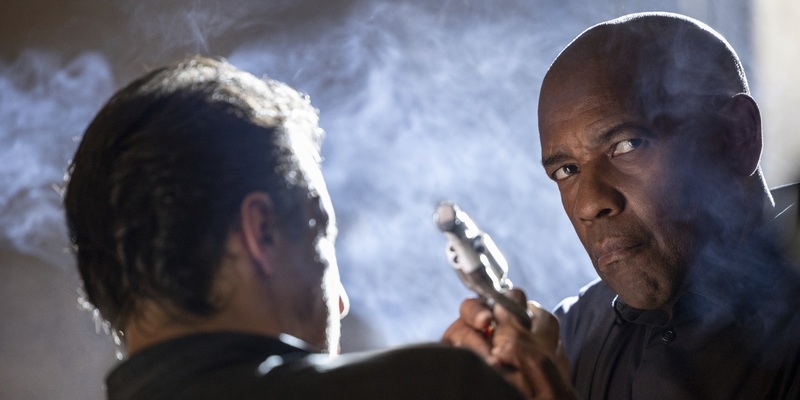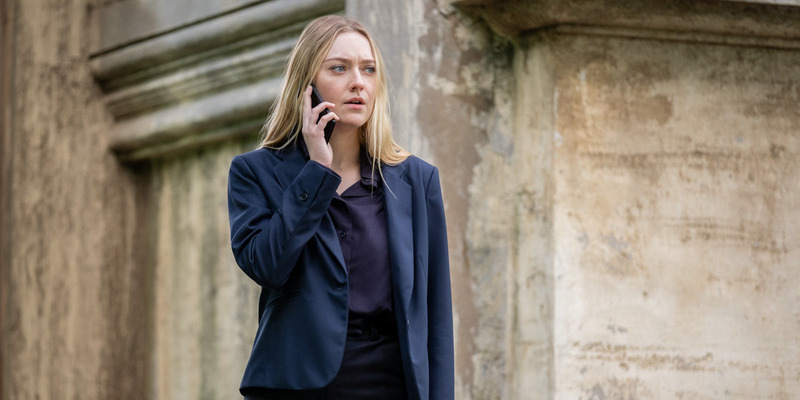
Review by
Eric Hillis
Directed by: Antoine Fuqua
Starring: Denzel Washington, Dakota Fanning, Sonia Ammar, Remo Girone

The spaghetti western wave of the 1960s and '70s saw scores of Italian
filmmakers deliver their distinctively operatic and Catholic take on the
tropes of that very American genre. With the third and best instalment of
his vigilante franchise, Antoine Fuqua might be the first American
director to make a reverse spaghetti western. Here we have an American
giving us his spin on the sort of violent thrillers that came out of Italy's
"Years of Lead" period of tumult in the '70s, along with more than a nod to
the various Mafia-centred Italian TV shows that have arrived in the wake of
Gomorrah. But coming full circle, the movie is essentially a western about a "good"
man forced to take a stand to save the townsfolk he loves.
I put quotes around "good" because Denzel Washington's Robert McCall
isn't sure himself if he falls into that category. The movie opens with the
bloody aftermath of a massacre perpetrated by McCall on the Sicilian
vineyard of a Mafioso with terrorist connections, and the level of violence
suggest McCall may enjoy inflicting such horrors on his enemies. After
wiping out all the adults on the winery, claiming he came to "take back
something that was stolen from someone else," McCall is shot in the back by
a young boy he refused to kill. Driving away, McCall collapses and is
discovered by Gio (Eugenio Mastrandrea), a caribinieri officer who
takes him to Enzo (Remo Girone), the local doctor in the small and
ridiculously picturesque town of Altamonte. While tending to his wound, Enzo
asks McCall if he's a good man. "I don't know," is his reply. The doc
reasons that only a good man would admit such a doubt.

As McCall recovers, hobbling on a stick around the cobbled streets of
Altamonte, he instantly warms to the place. Old ladies give him freshly
plucked lemons for his tea; the fishmonger refuses to accept payment from a
friend of the town doctor; and the local barista (Gaia Scodellaro)
makes googly eyes at this handsome American stranger.
But like any good western town, this one has a dark side. Local mobsters
run a protection racket, emasculating small business owners and humiliating
them in front of their children. Even Gio's uniform doesn't give him an
exemption from the cruelty of these gits. At first McCall watches from afar,
but as he falls for Altamonte, he realises he's going to have to take a
stand to protect his new home.

From the bloodshed of the opening scene it's clear Fuqua is aiming for
something far grittier than the previous instalments of his reboot of the
'80s TV show. There's a level of violence here that in Hollywood terms we've
only witnessed in the last couple of Rambo movies, with McCall tearing
throats to ribbons and in one ingenious piece of grand guignol, mowing down
a mobster while his pistol is embedded in another of his victim's skulls.
You can't help but surmise Fuqua's desire to set his third chapter in Italy
was inspired by that nation's brand of over-the-top violent thrillers. He's
clearly a fan of the western too (his remake of
The Magnificent Seven
is worth a watch), though he's clearly enjoying the subversion of having his
hero clad in black here.
When we think of the stubbly, sweaty faces of the villains of spaghetti
westerns, we're thinking of Italian character actors, and the casting
director here has come up with some classic scuzzball faces. The villains
here really are a horrible lot, which excuses the level of violence McCall
ultimately inflicts upon them. That said, I'm not sure an Italian would
commit the fashion crime of wearing double denim, as sported by some of the
hoods here.

The showy direction Fuqua opted for in the previous two instalments felt
jarring when set against Washington's calm portrayal of an aging and
gentlemanly killer. He appears to have matured as a director in the
intervening years, and his studied approach here is more befitting a series
centred on a man who can't move as quickly as his adversaries but is always
two steps ahead (to use a football analogy, McCall is the Teddy Sheringham
of action heroes).
By this point Washington has made this role his own, even if the movie
never explains how this man of modest means can now travel the globe to
enact his brand of justice. There's a thrilling scene in which McCall
finally stands up to the young hoodlums, and for those of us over a certain
age there's something primally satisfying about watching this old duffer
tell a young punk to get off his lawn...or else. This scene also boasts one
of the coolest verbal interactions in an action movie since John Milius
stopped doctoring scripts. Washington delivers the line in a way only he
can.


